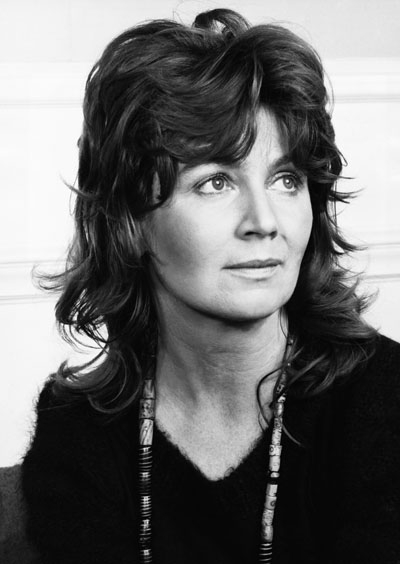Edna O’Brien would obviously never write a typical Irish ‘misery memoir’, though she has experienced more misery than is quite fair, even to the point of planning suicide. Country Girl is an emotional roller-coaster of a book, beginning with two disturbing dreams of her old home, setting the elegiac tone.
Family life was a ‘ragbag of anecdote, hearsay, allegory and consternation’ in a large two-storey stone house among fields in Co Clare, every room and every object in which is summoned up on the page. Father had been prosperous, but was so no longer, and he drank. Mother, whose ways and sayings are recalled as if yesterday, was of poorer country stock and fervently devout. Rosaries, rituals, holy pictures and stories of saints and the fires of Hell, not to mention mother’s dominant personality, filled and fuelled the imagination of the susceptible child, who was already scribbling stories. Her convent education gave her Latin and Shakespeare, and her first experience of being in love — with ‘my nun’.
When she came across a copy of the sensational Victorian novel East Lynne, she discovered that ecstasy and terror were to be found in the intensities of romantic love. She takes two-and-a-half precious pages to recount the plot of the book: it was that important, though not so important as Anna Karenina was to be. Later she read everything she could lay her hands on. Her literary heroes remain Joyce and Beckett.
Mostly the writing here is top-grade classic O’Brien, flowing along like the Liffey in spate and then astonishing the reader with an unexpected word or phrase which turns a sentence to gold. There is something precarious about this, as if she herself may not know where or why or when the golden bits erupt. She writes about sex as she always has, as if she has no idea that she is saying anything untoward — shameless in a good way. She moves between the wildly eloquent and the dead-pan. Joyce meets Beckett, perhaps. She leaves stories of romantic encounters or traumatic events suggestively curtailed, so you go on wondering, and quotes the lethal phrases of hostile literary critics without comment. In writing, she knows exactly where to stop. In life, not.
She was deflowered, uncomfortably, in a field by a Dublin journalist (married) and then ran away with an older man, Ernest Gebler, famous then for having written a bestseller, Plymouth Adventure, which was filmed with Spencer Tracey. In one black slapstick episode, the lovers are ambushed by her father, her brother, two policemen and an abbot waving a crucifix. Gebler got beaten up and Edna stayed with him, thus breaking with her family. The couple and their two little boys moved to London SW20 — ‘bleak suburbia’ — where she wrote her first novel The Country Girls in three weeks. It was a sensation. Gebler could not bear her success. He made her endorse all her pay-checks to him.
After the horrors of separation, fights over custody, divorce, penury in rented rooms, she soared in her glamorous thirties into social and professional stardom. The 1960s were party years. Robert Mitchum took her home and stayed the night. Paul McCartney played and sang to her sons in their beds. She moved into upmarket Carlyle Square. She sat next to Marlon Brando at dinner. ‘Richard Burton rang the doorbell one Monday evening . . . .’ She dined with the Snowdons at Kensington Palace and with the Clintons at the White House. Jackie O claimed her as a best friend. That’s just a minuscule sample of the theatre and film people, the famous writers, politicians and glitterati who were her playmates. Cinderella went to the ball, nightly.
It all came to an end, and the image that remains is of Edna O’Brien alone and lonely, walking the night streets of Chelsea, sitting on benches, talking to other night-wanderers.
She has received over the years numerous awards for her writing and mentions none of them, only describing with some irony the unveiling of a plaque in her honour on one of the stone piers at the gateway to the family home in Clare, now abandoned and dilapidated. She does not dwell on the foully vituperative reception of her early books in her own country, preferring to mention those compatriots who took her work seriously, though there is less here on literary success than on disasters. The worst of these were her humiliating forays into Hollywood screenwriting, starting with flowers and flattery and ending by being told, ‘This is half-baked rubbish’.
She is brave, modest, bewildered. A streak of shrewdness seems undermined by whatever is the opposite of wisdom. To heal her divided self, she took LSD with R.D. Laing, and put herself into the hands of astrologers, gurus, seers, crystal-gazers and quacks — exactly the kind of thing that the old Penny Catechism, which she surely must have learned as a child, condemns: ‘spiritualists and fortune-tellers, and trusting to charms, omens, dreams and suchlike fooleries’.
There was a void left by the loss of the approval of mother, Mother Church and Mother Ireland. It was filled by literature, her work, and above all by the heightened extremes of passionate love with all its ‘raptures and ruptures’ — and there were always ruptures, because her most significant lovers were married men, unidentified but described and characterised pretty forensically. These lacerating affairs have been the raw material for many of her stories and novels, served up still saignant. ‘Perhaps I wanted love too much ever to reconcile it with everyday life.’
In the incandescent Carlyle Square days her elderly mother, on her annual visit, would lie upstairs while a party raged below, and when Edna went up hours later she would be still awake, waiting. ‘Once, sitting up in bed, reprovingly, she asked, “Are you or are you not a good girl?”’
Yes, Edna O’Brien, you are a good girl, and a good writer.






Comments